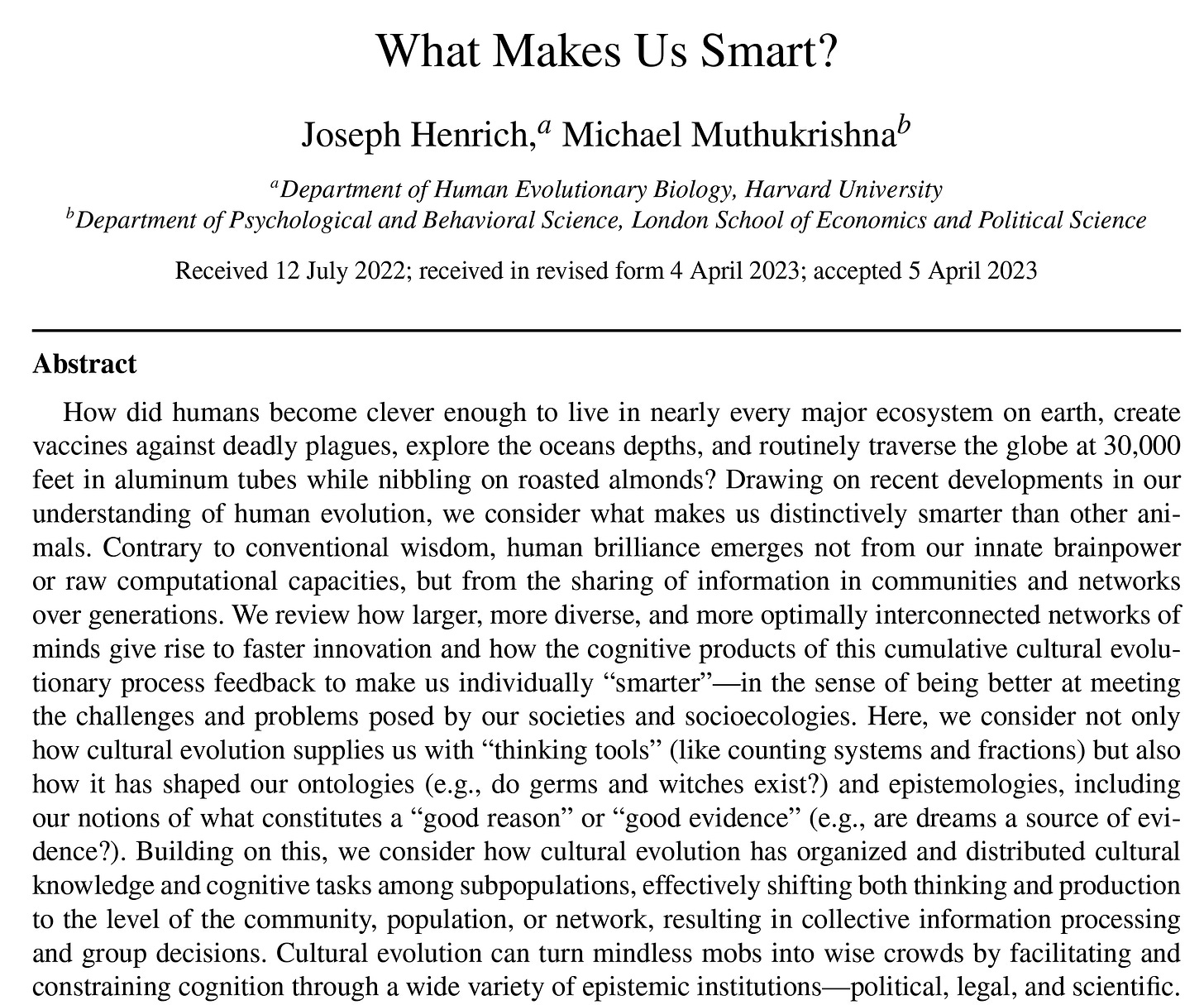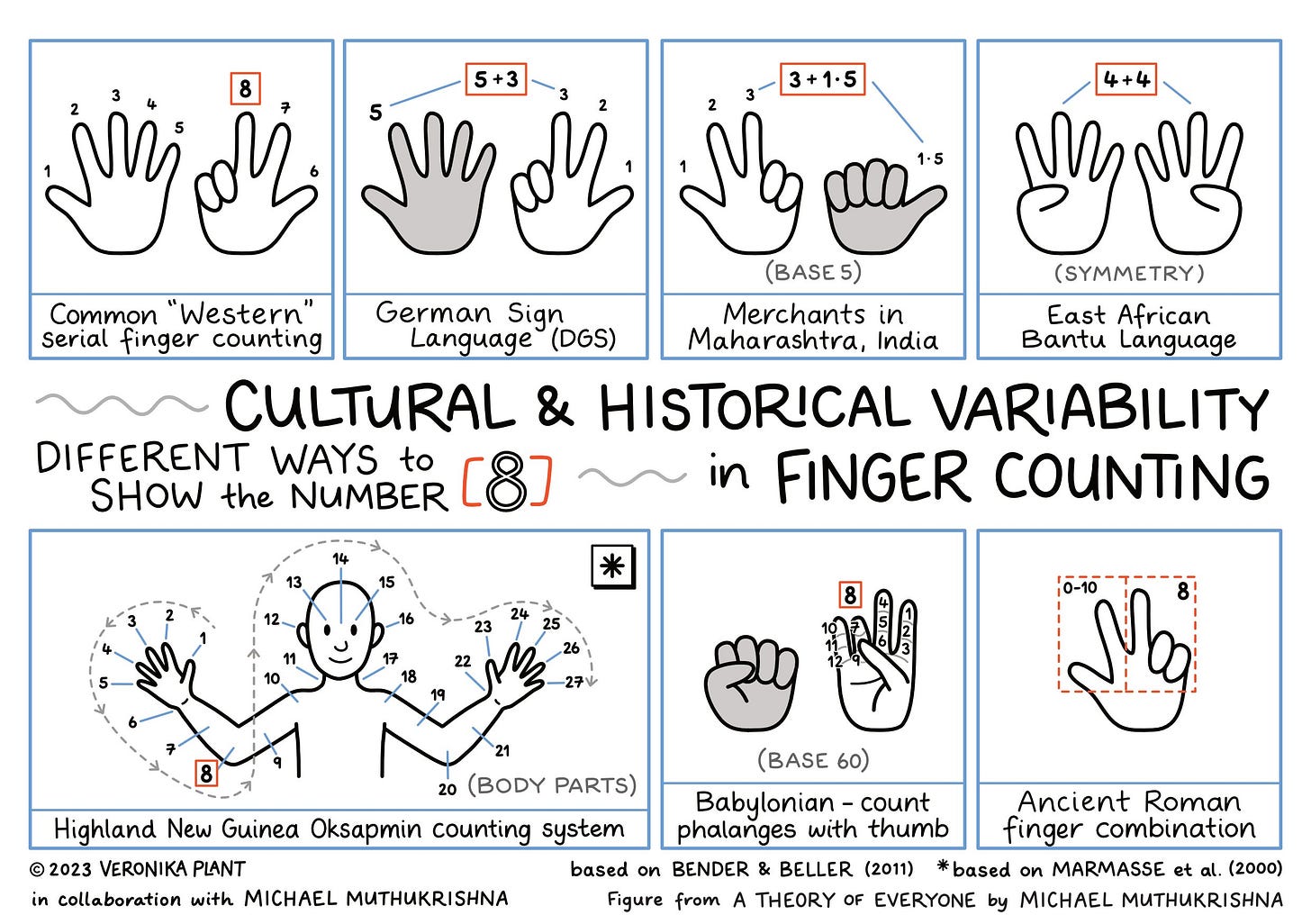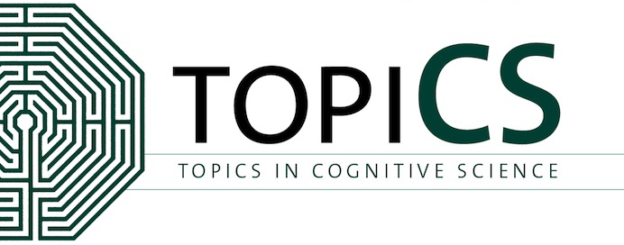Summary from Twitter thread:
New paper on “What makes us smart?“.
Unpacked in my soon-to-be-released book, “A Theory of Everyone“.
Here’s the take home: Studying hardware won’t help you understand the capabilities of pivot tables in Excel nor Code Interpreter in ChatGPT.

Your head is filled with entire analogies, metaphors, epistemologies, and tools that you once learned and now effortlessly use for thinking. It’s how you cook, how you count, and why you think invisible germs are a good explanation for disease. But invisible spirits are not.
Studying our genes and neural hardware won’t help you understand human intelligence. Our cultural software endows us with *new* cognitive capabilities.
How does this software get written? How do we become more brilliant, creative, and improve our education systems?
Consider how we count. We went from counting 1, 2, 3, many, as some small-scale societies still count, to a full-blown number system. Numbers likely emerged as an innovation for more efficiently tracking cattle and crops – you need to know who owes you what!
This new cognitive capability used a metaphor – fingers. But there’s nothing unique about fingers & 10 is awkward (16 would be better). Cultures have counted on body parts from base 6 to 27. But to count beyond body parts, we needed a different metaphor. Something like stones.

‘Calculus’ comes from ‘pebble’ (think calcium or limestone), and was used for addition and subtraction. Stones let you think about addition or subtraction beyond how creative you can get with body parts. There are some stones, and you can throw down more or snatch some away.
Stones are great for natural numbers: 1, 2, 3, 4, 5, etc. But stones don’t make zero obvious. What does zero pebbles look like? It looks a lot like zero of everything else – it’s nothing – and ‘nothing’ is hard to imagine. Zero came a lot later. What about negatives?
The number line as a metaphor helped make zero more concrete and easily transmissible even to children. Number lines work by mapping numbers not to objects but to movement and position, but they also revealed the negative numbers, which are not otherwise intuitive!

“Negative numbers darken the very whole doctrines of the equations and make dark of the things which are in their nature excessively obvious and simple” as Francis Maseres complained in the 18th century.

Nothing about numbers is intuitive to our ape brains. But these metaphors, mental models, and cultural innovations – cultural software – literally changed our minds and gave us new capacities. They’re like software upgrades.
These kids have a Soroban abacus in their heads allowing them to swiftly add large sums: 3267 + 9853 + 6531 + 7991 + 2641 in seconds. It’s a brand new cognitive capability. New cultural software. Video here: https://twitter.com/mmuthukrishna/status/1684576156803289091?s=20
Some innovations are more general than others. For example, thanks to the invention of writing, I can convey information through straight and squiggly lines on a page. I’m doing it right now and I’m literally changing your brain.
Another lesson: Mental tools can go out of date. Mental math became less useful. My middle school teacher, warned us about not being able to +, -, x, / without a calculator (because we wouldn’t be carrying calculators in our pocket). He didn’t foresee the arrival of the iPhone.
Much of what we assume are human capabilities are actually cultural software, invented and transmitted. This can be hard to see because we all live in a bubble. Academics in Ivory Towers, coastal elites, rural small towns – all part of a big bubble.
Almost everyone you’ll ever meet went to school; can all read, write, & count; and consumes some form of television and online media.
Breaking out of this big bubble requires going back in time or to far-flung places.
History – the cultural fossil record – shows that we didn’t always have a number system. Anthropologists in far-flung sites get laughed at explaining germ theory: ‘This guy thinks there are invisible animals, “germs”, in the water!‘
If that seems crazy because we grew up in a world where people took germ theory for granted, remember that less than 150 years ago, doctors didn’t believe fewer mothers might die if they washed their hands between examining a dead body and delivering a baby.
If our cultural software is what makes us smart, it means that we can be deliberate in how it gets written. We can seek out new mental models, intellectually arbitrage our way to creativity & discovery, and revitalize our education systems.
If you liked this post and want to learn more about how cultural evolution can be applied to our lives, companies, and societies, please pre-order A Theory of Everyone: https://linktr.ee/theoryofeveryone. Pre-orders really help with the success of the book and Amazon pre-orders guarantee the lowest price. Thank you!








